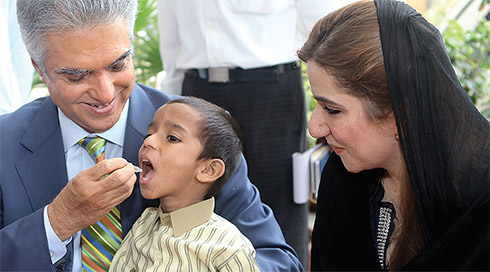
WORLD IS POLIO FREE EXCEPT PAKISTAN, AFGHANISTAN & NIGERIA- CORPORATE SECTOR LENDS STRONG SUPPORT FOR POLIO ERADICATION
Apr 16 – 22, 2012
Interview with Aziz Memon
AMANULLAH BASHAR
It is naturally painful to know that Pakistan is one of the three countries in the world where polio infection has yet to be eradicated whereas even poorer nations have successfully managed to overcome this potentially dangerous health issue.
Although the corporate sector as well as the government are lending a strong support to the worldwide campaign against polio launched by Rotary International, yet the virus is still posing serious threats in certain areas of the country such as FATA and other rural areas in Khyber Pakhtunkhwa, Balochistan and even in some pockets of rural Sindh.
The poor literacy rate or ignorance is the major reason propelling health issues due to lack of awareness that how essentially important are the hygienic conditions for healthy living. Poverty as well as law and order are other hurdles, which usually restrict polio vaccination out reach in the war hit or law and order affected areas especially in FATA and Balochistan.
This was revealed by Aziz Memon, National Chairman Pakistan Polio plus Committee in an exclusive interview in Karachi.
Aziz Memon, who is also the Chairman of Kings Group, expressed his serious concern over what he called poor awareness about seriousness of polio inflection primarily due to poor literacy rate in less developed parts of the country including Khyber Pakhtunkhawa which is on top of the list of polio infection, while Balochistan and rural Sindh come to second and third order in respect of polio infected children.
It is important to know that why it is necessary to completely eradicate polio virus and how we would achieve this target, Aziz said and added that so far Rotary has spent a huge money of over $1.1 billion for polio eradication by launching a worldwide vaccination campaign in which the corporate sector through out the world and within Pakistan has provided supports whole heartedly.
As a result of this campaign initiated by Rotary International, the small pox has been totally eliminated from our world and certainly the polio will also be vanished sooner or later.
However, we have to keep a constant watch over its eruption anywhere in the country, Aziz said.
Giving the pathetic hygienic conditions prevailing in rural Sindh, he said that they had constructed over 500 toilets in the flood-affected areas to facilitate the displaced families. However, it is shocking to see that either these toilets have been converted into stores or dismantled for other reasons. This is yet another challenge to create awareness among the people that cleanliness and hygienic conditions are vitally important for healthy life.
He cited the example of India which had made tremendous progress in the fight to end polio. The last reported polio case in India was reported on Jan 13, 2011 in West Bengal and on Feb 25 the world health organization removed India from the polio-endemic list, meaning it has been deemed to have stopped indigenous transmission of wild poliovirus. This is the culmination of years of progress for India. The country reported just 42 cases in 2010 as compared to more than 700 cases in 2009.
The World Health Organization estimates that India had approximately 75000 polio cases in 1988.
Aziz Memon, who is devoting his time and energy as a volunteer of the global polio eradication initiatives of Rotary which considers polio eradication as the top philanthropic goal all over the world. As far as Pakistan is concerned, the disease continues to threat and if serious efforts are not undertaken to eradicate polio the number of infected children can multiply going forward.
In Pakistan, polio cases were reported 79 percent from Balochistan, while areas like FATA and rural areas of the country pose difficulties on the back of geographical isolation, poor public infrastructure and of course the armed conflict and cultural barriers.
He said that Rotary was the initial investor in polio eradication in 1985 and a study estimates $40-50 billion in benefits. More than eight million cases of life long polio paralysis were prevented as a result of these efforts.
The world must remain committed in order to achieve a polio free world, he said and added that we have the technical tools to end polio. If we don’t stay the course experts say polio could rebound to 10 million cases in the next 40 years and would negate the world’s 9 billion dollar global investment in the initiative, he warned.
The human cost: By eradicating polio, children across the entire world will benefit, and no child ever again knows that pain of polio-paralysis.
We have the technical tools to end polio and the means to reach all children. A new, bivalent vaccine targeting the two remaining strains of polio in one doze has shown great results. The tools to eradicate other diseases like HIV are not available. More than two hundred countries, territories and areas are now polio free.
Although the global investment in a polio-free world exceeds eight billion dollars, an independent study published in medical journal Vaccine estimates the net economic benefits will be 40 to 50 billion dollars over the next 20 years-a savings that can be put toward fighting other diseases.
In fact, polio eradication activities are also strengthening routine health services. An active disease surveillance network has been established in al countries into which other diseases-including measles-are now being integrated.
Polio eradication infrastructures are also used for the provision of other health interventions.
Success in polio eradication sets the stage for the next big global health initiative. The ability to reach all children with the polio vaccine is a proof of concept that the world can undertake another major global health initiative.